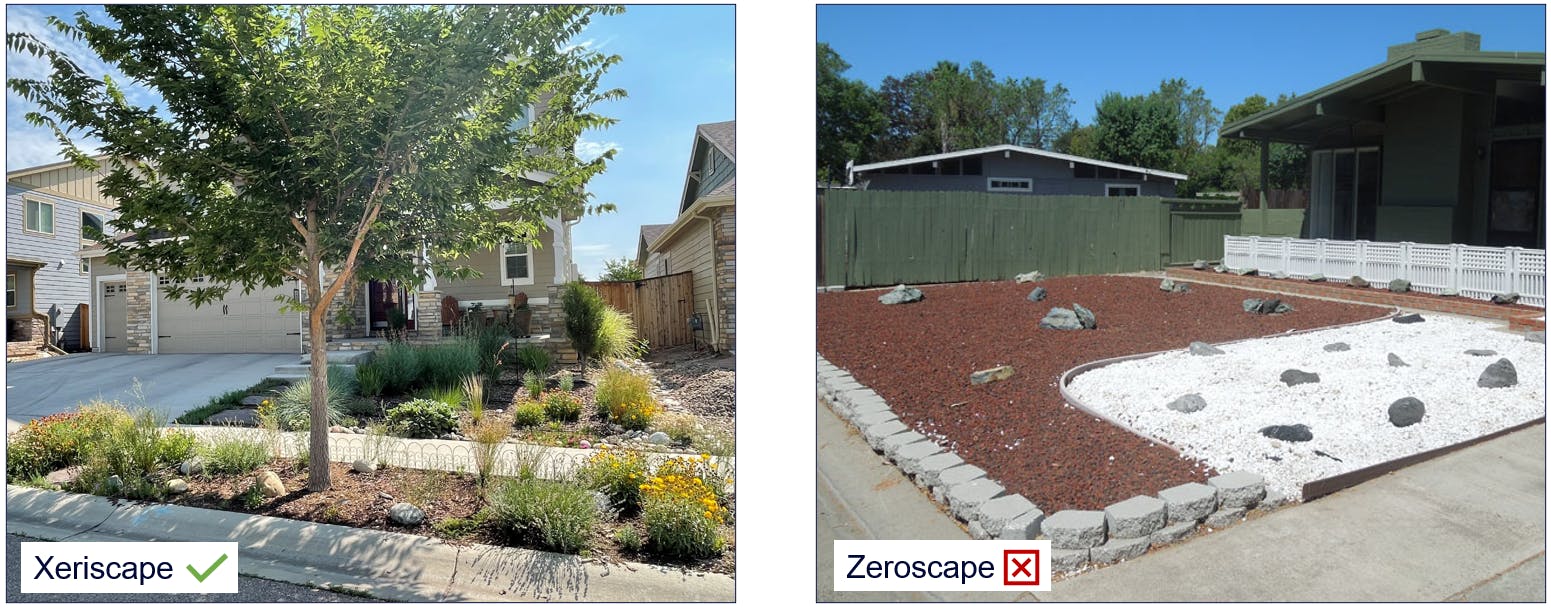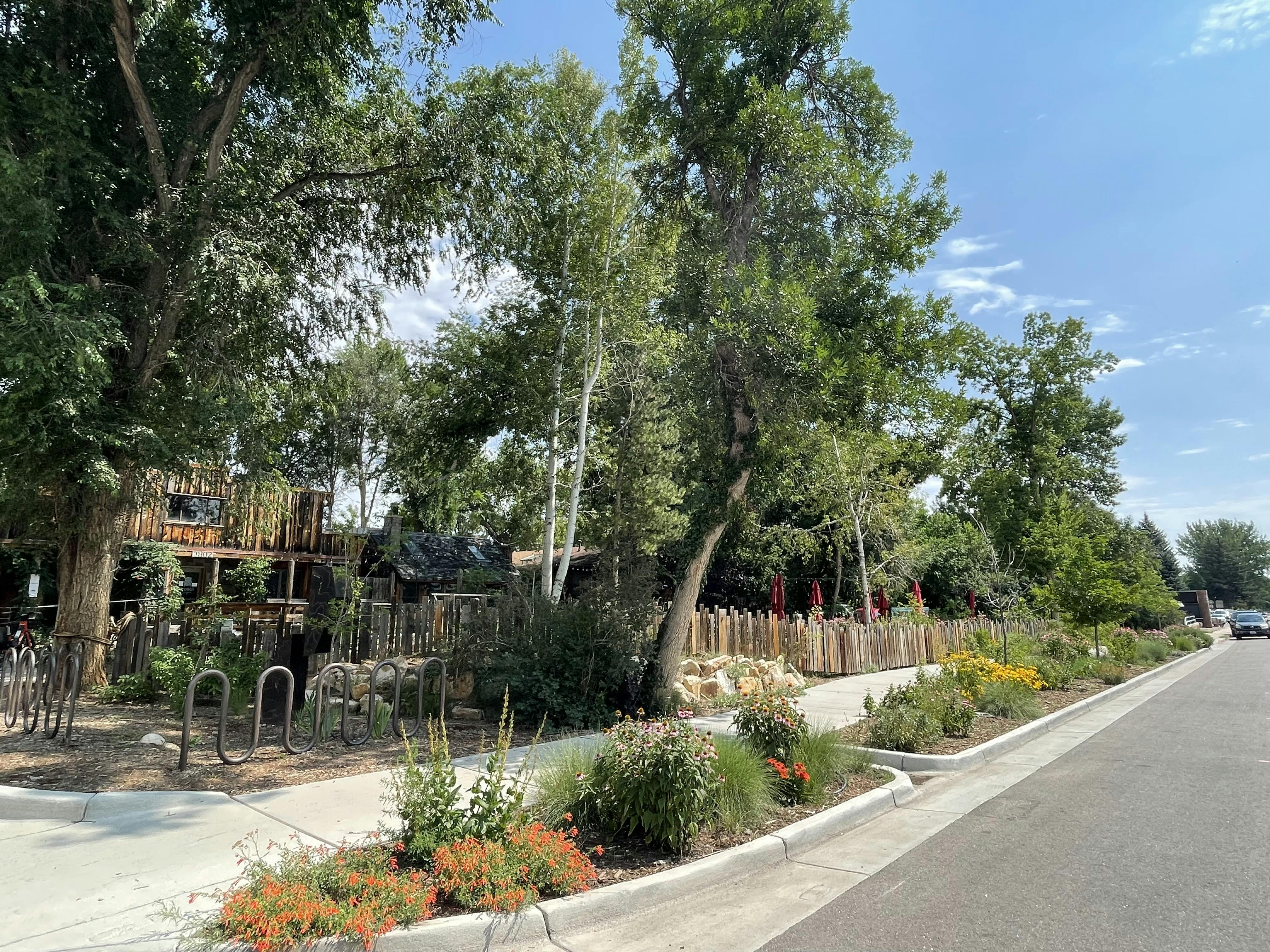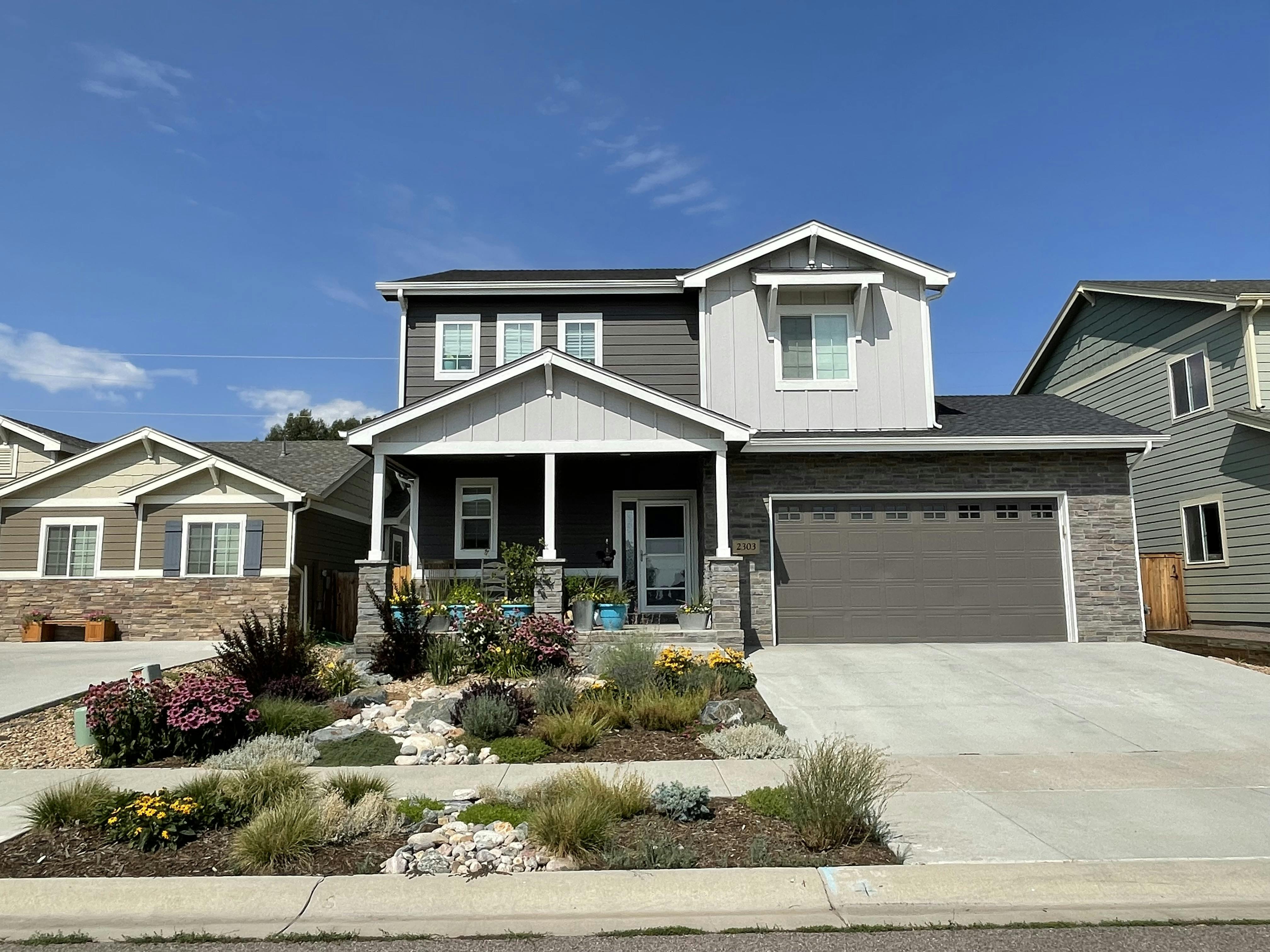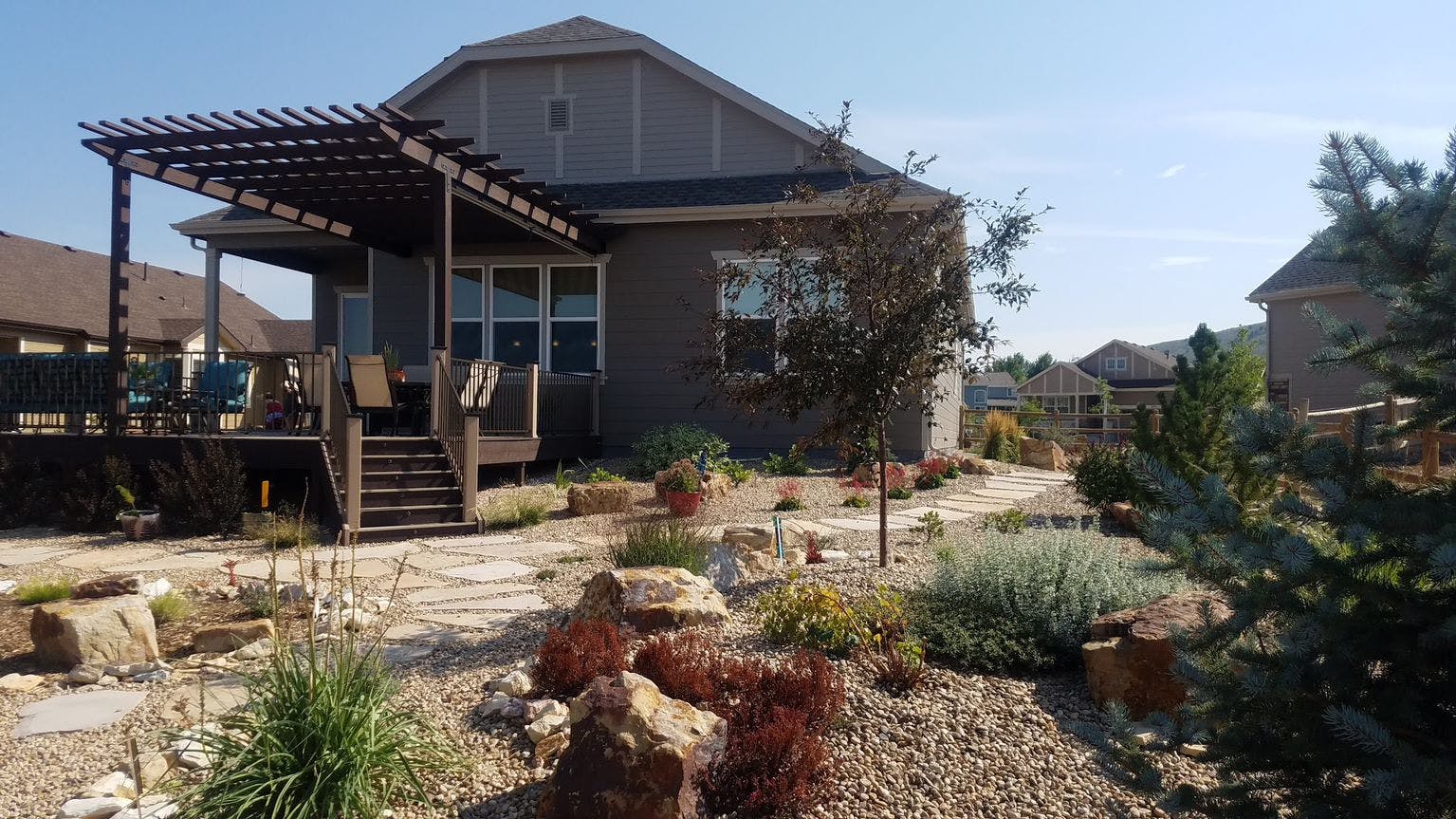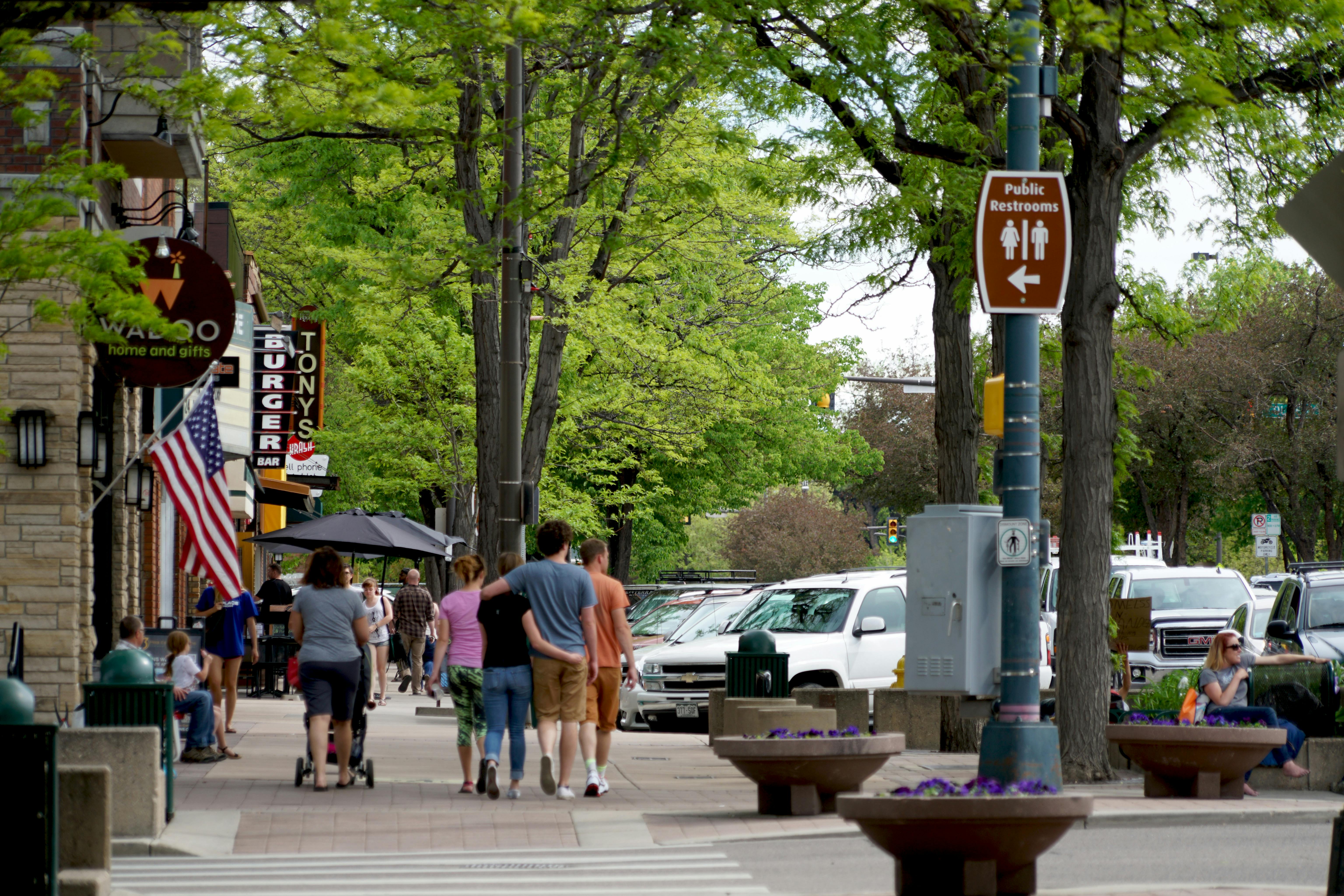Xeriscape and Soil Amendment Policy Update
Consultation has concluded
Healthy and diverse landscapes help improve the environment by providing shade to reduce the heat island effect, aiding in air purification, providing wildlife habitat, erosion control, stormwater control, and other benefits that ultimately improve the quality of life for residents. Waterwise landscapes are more resilient to a changing climate, can still thrive in times of water shortages, and are better suited for our arid climate.
City of Fort Collins staff will present policy proposals for adoption consideration in early 2024. The proposal is designed to promote best practices and healthy landscapes during and after land development occurs. The following four objectives have driven policy development:
- Reducing grass and increasing resilient, waterwise landscapes
- Improving the irrigation efficiency in our community
- Enhancing the health of our soils
- Protecting our urban canopy
Learn more about each proposal.
Read about the project background.
Healthy and diverse landscapes help improve the environment by providing shade to reduce the heat island effect, aiding in air purification, providing wildlife habitat, erosion control, stormwater control, and other benefits that ultimately improve the quality of life for residents. Waterwise landscapes are more resilient to a changing climate, can still thrive in times of water shortages, and are better suited for our arid climate.
City of Fort Collins staff will present policy proposals for adoption consideration in early 2024. The proposal is designed to promote best practices and healthy landscapes during and after land development occurs. The following four objectives have driven policy development:
- Reducing grass and increasing resilient, waterwise landscapes
- Improving the irrigation efficiency in our community
- Enhancing the health of our soils
- Protecting our urban canopy
Learn more about each proposal.
Read about the project background.
-
Draft Proposals: September 2023
Share Draft Proposals: September 2023 on Facebook Share Draft Proposals: September 2023 on Twitter Share Draft Proposals: September 2023 on Linkedin Email Draft Proposals: September 2023 linkOctober 1, 2023 Update:
With careful consideration of community input, Board and Commission input, and input from staff in impacted departments, the following policy proposals have been developed. They will be subject of discussion at the October 10, 2023 City Council Work Session.
Limit cool-season grass (turf) in new development and redevelopment
This proposal would impact all properties seeking approval for new or significant redevelopment of a property including the front yards of single-unit dwellings.As used in this proposal, irrigated turfgrass with a high-water requirement means sod forming grasses that require 10 or more gallons per square foot per season of supplemental water. This includes species such as Kentucky bluegrass and turf-type tall fescue and their varieties and cultivars.
For single-unit dwellings: Irrigated turfgrass with a high water requirement cannot cover more than 30% of the total landscape area of a front yard, not to exceed a maximum area of 1,000 square feet.
For all other properties: Irrigated turfgrass with a high water requirement cannot cover more than 30% of the total landscape area of the property, not to exceed a maximum area of 10,000 square feet. Exceptions may include recreational and active play areas and other high-use areas.
For front yards and all other properties:
- Properties shall not contain any artificial turf
- Parkways attached to the common irrigation system of a property are not considered part of the total landscape area.
Expand irrigation efficiency standards
Trees: All development plans shall show dedicated subsurface or on-surface irrigation to all new and existing trees on-site.
Highly efficient irrigation standards for residential properties: All development plans on residential front-yards must show high-efficiency equipment and design standards.
Watering window: All properties within Fort Collins city limits shall not use overhead irrigation (e.g., pop-up sprinklers) from 10 a.m. to 6 p.m. to irrigate turf and landscaping, May through September. Staff are engaging in conversations with raw water users in the city to learn whether the same type of limitation on raw water could be considered in the future.
- Exceptions may include:
- Properties establishing grass seed or sod.
- Maintenance of the irrigation system that requires turning on overhead irrigation during the watering window; a maintenance worker or landscaper needs to be seen on the property while the zone is turned on.
Increase flexibility, compliance, and enforcement in existing soil amendment code
- Define standards for soil compaction and soil quality
- Remove barriers for implementing soil standards in a way that is most beneficial and sustainable - allow consideration of existing soil and/or plant type for optimum establishment and growth.
- Clearly define thresholds for applicability
- Implement comprehensive field inspection program for all sites including landscape projects that impact more than 1,000 square feet of the area of an existing property
Tree Policy
Tree-related policies have been strong in Fort Collins for several decades and have created the urban tree canopy that we have here today. However, with the demands of development, redevelopment, and additional pressures on the canopy, the proposed policy updates create a stronger focus around tree preservation and protection. The goal is to save more trees and create a more resilient urban forest related to, but not limited to, the built environment pressures, water shortages, a changing climate, and the introduction of future invasive pests. Proposed updates include:
- Improved mitigation standards incentivizing tree preservation
- Creation of separate street tree escrow and timeframe for tree replacement responsibility
- Strengthened penalties for tree damage violations or healthy tree removal
- Improved tree diversity requirements
- Improved tree protection during construction
-
Staff Summary: Spring 2023 Community Stakeholder Workshops
Share Staff Summary: Spring 2023 Community Stakeholder Workshops on Facebook Share Staff Summary: Spring 2023 Community Stakeholder Workshops on Twitter Share Staff Summary: Spring 2023 Community Stakeholder Workshops on Linkedin Email Staff Summary: Spring 2023 Community Stakeholder Workshops linkUpdated May 2023:
The second round of public engagement for this project occurred March-April 2023. There were six total workshops over each of the three proposals (see April 10, 2023 proposals here) that were broken into two parts, of which the second set of workshops built upon the first. In total 22 people participated, 16 represented external stakeholder groups and six were internal City staff. Represented stakeholders included landscape professionals, landscape architects, nurseries and wholesalers and engineers.
The discussions were engaging and insightful! We learned that overall, participants agree with the draft proposals for commercial landscapes but had varied perspectives and more questions about the residential proposals. Additionally, they highlighted the importance of considering how turf would be used when deciding where it should be allowed, and they largely agreed on the need to have landscapes that are attractive and use less water, as well as the challenges associated with making these changes in the context of our community's long-standing tradition of widely using turf.
Some general themes that came out of the workshops were:
-
Staff Summary: Alignment with Forestry Updates
Share Staff Summary: Alignment with Forestry Updates on Facebook Share Staff Summary: Alignment with Forestry Updates on Twitter Share Staff Summary: Alignment with Forestry Updates on Linkedin Email Staff Summary: Alignment with Forestry Updates link
Trees add multiple benefits to an urban setting. While exploring water conservation measures to Fort Collins landscapes, trees need to be a part of the conversation as they can be a tool for increased resilience to a changing climate.
A healthy urban forest can reduce energy use, help remove air pollutants, reduce the Urban Heat Island effect, and offers other economic and social benefits that can lead to an improved quality of life. Fort Collins has an estimated 57,000 public trees, of which many are integral parts to the landscapes of homes, businesses, community parks and meeting areas.
Fort Collins City Council has identified two priorities for Forestry staff to improve tree policies and create solutions for a tree planting subsidy. Since these initiatives deal with the same landscapes the Xeriscape and Soil Amendment proposals affect, Utilities’ Water Conservation staff have partnered with Forestry staff to present these items together. The team has plans to present their proposals to Fort Collins City Council on November 21, 2023, following weeks of talking to boards and commissions.
-
Draft Proposals: April 10, 2023
Share Draft Proposals: April 10, 2023 on Facebook Share Draft Proposals: April 10, 2023 on Twitter Share Draft Proposals: April 10, 2023 on Linkedin Email Draft Proposals: April 10, 2023 linkAs of April 13, 2023, the draft proposals being considered are:
Proposal 1. Limit cool-season grass (turf) in new development and redevelopment
Commercial properties to not contain more than 30% turf, not to exceed 10,000 square feet, and with no single turf area less than 300 square feet. Exceptions may include: 1) recreational and active play areas and 2) other high-use areas. Please note, even if an exception is approved, the landscape water budget for the total landscape area must average at or below 15 gallons/square foot/season
Residential properties to not contain more than 30% turf, not to exceed 1,000 square feet, and with no single turf area less than 300 square feet. Exceptions may include: 1) houses that do not contain a backyard.
For both residential and commercial:
- Properties shall not contain any synthetic turf.
- Parkways attached to the common irrigation system of a property are considered part of the total landscape area.
Proposal 2. Expand irrigation efficiency standards
Trees: All development plans shall show automatic drip irrigation to all new and existing trees on-site.
- If the development is to use non-potable water for watering the landscape, all new and existing trees on site must be served by a drip system that utilizes bubbler emitters to prevent clogging.
- The ring of the drip line must be an appropriate diameter to continue watering the tree once the tree is at full maturity.
Residential High-Efficiency Standards: All residential development plans must show high-efficiency equipment and design standards.
Watering Window: All properties within Fort Collins city limits shall not use overhead irrigation (e.g., pop-up sprinklers and hose-dragging attachments) from 10 a.m. to 6 p.m.
- Exceptions may include:
- Properties establishing grass seed or sod after applying for a permit.
- Maintenance of the irrigation system that requires turning on overhead irrigation during the watering window; a maintenance worker or landscaper needs to be seen on the property while the zone is turned on.
- Properties that use hand-held hoses to water their landscape are exempt from this watering window; the owner or landscaper needs to be seen on the property with the hose and shut-off nozzle in hand.
- Water users that only use non-potable water. If the property is served by a Utilities water tap it must still abide to the watering window, even if non-potable water is used some of the time.
Proposal 3. Increase flexibility, compliance, and enforcement in existing soil amendment code
Loosening of Compact Soils to an 8-inch depth. Result must test less than 100 psi. Trees only require loosening.
Amendment of Soils: Soil test to determine appropriate inputs and volumes. If no soil test, 3 cubic yards of soil amendment per 1,000 square feet. Soil can be stockpiled and reincorporated once topsoil definition is met. Subgrade still to be loosened
- Exceptions may include:
- Native plant species
- Sites near active waterways
- Areas less than 1,000 square feet not required to provide documentation
- If the project schedule requires a temporary soil waiver (weather, project timeline)
Increased compliance and enforcement:
- Written certification of compliance
- Lab samples
- Soil Analysis Report including recommendations
- Receipts, tare/load tickets
- Photos of installation as proof
- On-site inspections of soil amendment and loosening
- Administrative fee
-
Draft Proposals: March 8, 2023
Share Draft Proposals: March 8, 2023 on Facebook Share Draft Proposals: March 8, 2023 on Twitter Share Draft Proposals: March 8, 2023 on Linkedin Email Draft Proposals: March 8, 2023 linkAs of March 8, 2023, the draft proposals being considered are:
Proposal 1. Limit cool-season grass (turf) in new development and redevelopment
-
Commercial properties: Total property no greater than 30% turf
- No single turf area less than 300 sq ft
- Total turf area no greater than 10,000 sq ft (exceptions may apply)
-
Residential properties: Front yards no greater than 30% turf area
- No single turf area less than 300 sq ft
- Total turf area no greater than 1,000 sq ft
- Revise existing code language to clearly restrict synthetic turf
- Pair with an educational campaign about alternatives to synthetic turf
Proposal 2. Expand irrigation efficiency standards- Require dedicated (drip) irrigation to trees in new development and redevelopment
- Extend high-efficiency equipment and design standards to new residential properties
- Restrict overhead watering from 10 a.m. to 6 p.m. (exceptions may apply)
Proposal 3. Increase flexibility, compliance, and enforcement in existing soil amendment code- Exceptions for location, project size, and plant type
- Soil amendments to be used minimally or not at all near waterways
- Soil amendments to be used minimally or not at all for native plants
- No documentation to verify certification required for areas less than 1,000 square feet
- Expand eligibility for temporary waivers and allow alternatives to tilling
- Aeration or other suitable no-till method as alternative to tilling for areas where compaction did not occur and planned landscape meets criteria (i.e., existing vegetation to remain, container plantings, plug installations, over seeding application, or xeriscape retrofitting as examples)
- Existing trees that are to remain will have their own soil-loosening guidelines
- Temporary soil waivers may be used in the event of 1) weather and 2) misalignment in Certificate of Occupancy timeline between the builder and the party who oversees the landscaping
- Incorporate best practices into soil amendment guidelines
- Topsoil, as confirmed by soil testing, can be stored using best practices for plans to reapply to the site; subgrade still to be loosened
- If topsoil definition is not met, soil can still be stockpiled and reincorporated once appropriate amendment has been applied to remedy the deficiencies.
- If no soil test occurred, soil amendment shall be thoroughly incorporated at a rate of at least 3 cubic yards per 1,000 square feet
- New and existing trees require only soil loosening, not soil amendment
- Topsoil, as confirmed by soil testing, can be stored using best practices for plans to reapply to the site; subgrade still to be loosened
-
Commercial properties: Total property no greater than 30% turf
-
Staff Summary: Jan. 10, 2023, City Council Work Session
Share Staff Summary: Jan. 10, 2023, City Council Work Session on Facebook Share Staff Summary: Jan. 10, 2023, City Council Work Session on Twitter Share Staff Summary: Jan. 10, 2023, City Council Work Session on Linkedin Email Staff Summary: Jan. 10, 2023, City Council Work Session linkKatie Collins, with support from Water Conservation Manager, Mariel Miller, and Deputy Director of Fort Collins Utilities, Gretchen Stanford, presented to five of the six council members at the January 10, 2023, City Council work session to confirm direction on the initiatives. Similar to the Natural Resource Advisory Board, Council did not support the use of synthetic turf, citing the potential for PFAS to leach into our waterways. Council members requested to see the cost differences between current and proposed irrigation standards. Water Conservation staff plans to complete the requested cost analysis in spring of 2023. Overall, council members were in support of limiting turf and increasing irrigation standards, but first would like to consider the cost estimates associated with policy change.
Furthermore, City Council would like to see more work done on the soil amendment proposal. Most conversations during this project have revolved around the xeriscape initiative, yet we cannot forget about healthy soils in Fort Collins and how they support xeriscape and water conservation measures. Council members agree that the current soil amendment process can improve and an evaluation of our soil amendment program would be worthwhile.
As the conversation was winding down, Mayor Jeni Arndt left everyone with prudent words to consider: “Never make a rule you can’t enforce.” Following the work session, the Water Conservation team followed up with Council’s questions and started work on a Round 2 of public engagement to help further define the proposals.
-
Staff Summary: Dec. 15, 2022, Water Commission Presentation
Share Staff Summary: Dec. 15, 2022, Water Commission Presentation on Facebook Share Staff Summary: Dec. 15, 2022, Water Commission Presentation on Twitter Share Staff Summary: Dec. 15, 2022, Water Commission Presentation on Linkedin Email Staff Summary: Dec. 15, 2022, Water Commission Presentation linkOn December 15, 2022, Katie Collins, Water Conservation Specialist, shared four opportunities to impact xeriscape and soil amendment policy with the Water Commission. The opportunities were based on best practices research and public engagement input. Water Commission provided input in advance of the City Council Work Session scheduled for January 10, 2023.
The opportunities:
- Less turf in new and re-development (three options)
- Allow synthetic turf in some scenarios
- Expanded irrigation guidelines and residential equipment efficiency
- Increase flexibility in soil amendment policy
The water commission agreed that high-water-use grass in medians and parkways serves little purpose and presented an opportunity to limit turf. Much of the conversation was about specific ideas to further the opportunities, as well as describing where the City can make improvements. Two large themes that came from this discussion were education and affordability.
-
Staff Summary: Dec. 15, 2022, Natural Resource Advisory Board
Share Staff Summary: Dec. 15, 2022, Natural Resource Advisory Board on Facebook Share Staff Summary: Dec. 15, 2022, Natural Resource Advisory Board on Twitter Share Staff Summary: Dec. 15, 2022, Natural Resource Advisory Board on Linkedin Email Staff Summary: Dec. 15, 2022, Natural Resource Advisory Board linkOn December 15, 2022, Katie Collins, Water Conservation Specialist, shared four opportunities to impact xeriscape and soil amendment policy with the Natural Resource Advisory Board. The opportunities were based on best practices research and public engagement input. The Natural Resource Advisory Board provided input in advance of the City Council Work Session scheduled for January 10, 2023.
The opportunities:
- Less turf in new and re-development (three options)
- Allow synthetic turf in some scenarios
- Expanded irrigation guidelines and residential equipment efficiency
- Increase flexibility in soil amendment policy
Board members were not in support of synthetic turf and wanted to see more research on how synthetic turf affected the environment. The intent to partner with other water districts and enforce these landscape standards equitably in all districts was made clear. Overall, the Board supported the proposed water-saving measures, except for artificial turf, and wanted to see less high-water-use grass around town.
-
Staff Summary: Fall 2022 Community Stakeholder Discussion
Share Staff Summary: Fall 2022 Community Stakeholder Discussion on Facebook Share Staff Summary: Fall 2022 Community Stakeholder Discussion on Twitter Share Staff Summary: Fall 2022 Community Stakeholder Discussion on Linkedin Email Staff Summary: Fall 2022 Community Stakeholder Discussion linkThe first round of public engagement for this project occurred August-November 2022. In November, two virtual discussions allowed representatives from heavily impacted industries to share input before policy direction was further developed. Attendees for these meetings included builders, HOA board members, landscape companies, realtors, and commercial property managers. Discussion topics included existing barriers to converting high-water-use landscapes to low-water-use landscapes, such as complicated processes and fees, as well as desires for future policy, such as exceptions/options, easy-to-understand code language, and making choices that benefit the environment and conserve water while remaining affordable.
-
Staff Summary: Aug. 20-Sept. 11, 2022, Community Survey
Share Staff Summary: Aug. 20-Sept. 11, 2022, Community Survey on Facebook Share Staff Summary: Aug. 20-Sept. 11, 2022, Community Survey on Twitter Share Staff Summary: Aug. 20-Sept. 11, 2022, Community Survey on Linkedin Email Staff Summary: Aug. 20-Sept. 11, 2022, Community Survey linkTo learn more about the community’s views surrounding landscapes, a survey was sent out to the public that asked ten questions about xeriscape, landscape aesthetics, and soil amendment practices in Fort Collins. The survey was open from Aug. 20 to Sept. 11, 2022, and received 929 responses with 5,878 comments. Staff were able to identify general themes from the results of this survey that later helped shape the initial set of proposals that were presented to Council at a work session on January 10, 2023.
Many different opinions were expressed, but most people seemed to understand that water is a limited resource and that landscapes could better reflect the local climate. People want xeriscaping to be easy to understand and affordable. While many individuals want to change their landscape, an important consideration is whether or not the government should get involved.
Lifecycle
-
December 2021-April 2022
Xeriscape and Soil Amendment Policy Update has finished this stageStaff research of statewide and national best practices for xeriscape and soil amendment code.
-
August-November 2022
Xeriscape and Soil Amendment Policy Update has finished this stagePublic Engagement Round 1: Collect feedback and gauge the public’s reaction to potential xeriscape and soil amendment code considerations.
-
Q1-Q2 2023
Xeriscape and Soil Amendment Policy Update has finished this stagePublic Engagement Round 2: Engage community stakeholders and City Council to further define strategies and code language.
-
Q2-Q3 2023
Xeriscape and Soil Amendment Policy Update is currently at this stageVet feasibility of code considerations with city staff to learn resource needs; draft code language; reengage community stakeholders; learn recommendations from Boards and Commissions on draft code.
-
Q4 2023
this is an upcoming stage for Xeriscape and Soil Amendment Policy UpdateOctober 10 2023- City Council Work Session
Nov 21 2023- City Council First Reading of Ordinance
TBD- City Council Second Reading of Ordinance
News Categories
- #about (2)
- #boardscommissions (2)
- #citycouncil (1)
- #community (2)
Who's Listening
-

Phone 970-416-4378 Email kcollins@fcgov.com -

Phone 970-221-6719 Email mamiller@fcgov.com -

Phone 970-221-6847 Email piengo@fcgov.com






